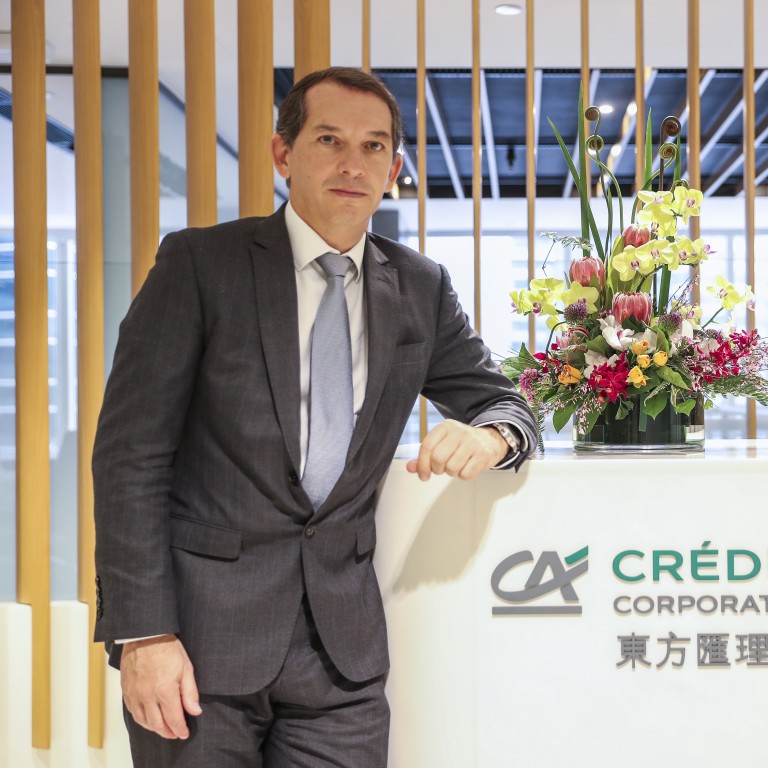
Chinese turn M&A sights on Europe as US deals come under scrutiny, Credit Agricole executive says
- Making deals work in Europe are a matter of finding the ‘right approach, the right partners’
- M&A clients, not just Chinese ones, are facing greater regulatory scrutiny
Europe remains an attractive investment destination for Chinese companies even as scrutiny of Chinese-backed deals has risen in recent years, particularly in light of the ongoing trade war with the US, according to a top French banker.
“We see a lot of clients that identify in Europe a lot of opportunities and who have the financial strength and the expertise to be successful in Europe,” said Jacques Ripoll, chief executive of Credit Agricole’s corporate and investment banking arm. “Every geography, every country has its specific characteristics. We have seen a certain number of hurdles on the financing side, on the political side for some companies to acquire or develop businesses in Europe.
“Is this a no go? I don’t think so. It’s a matter of finding the right approach, the right partners.”
The European Union implemented a new framework this month to screen foreign direct investment into the 28-nation bloc, as concerns have increased in recent years about overseas-led mergers and acquisitions, particularly by Chinese firms.
In a report released on April 12, GP Bullhound, a technology advisory and investment firm, said that outbound deal volumes by Chinese technology investors into Europe increased 25 per cent in the first quarter as US regulators were seen as a hurdle to Chinese-led deals.
The US has placed tariffs on nearly half of all Chinese goods imported into the country and dramatically increased its scrutiny of foreign-led deals and investments as US President Donald Trump has upped the pressure on Beijing to change long-standing practices on trade and restrictions on foreign businesses operating in China.
Ripoll noted that it is not just Chinese-led transactions that are facing expanded scrutiny.
The EU’s competition regulator recently blocked a Franco-German tie-up between Alstom and Siemens that would have created a European champion for train manufacturing.
French and German government officials had argued the deal would allow the combined company to better compete with Chinese rivals, but antitrust regulators feared it would lead to higher prices for the public.
“I think the hurdles that we see in doing business are not just one geography versus another,” Ripoll said. “It’s new rules, protecting customers and antitrust regulation. They apply to everyone. That’s where it’s important for Asian companies to have a partner of choice when they go abroad.”
Michel Roy, senior regional officer, Asia-Pacific for Credit Agricole’s corporate and investment bank, said he believes that Chinese investment into Europe will continue as its influence and the size of its economy increases.

“The weight of the Chinese economy in the world will keep growing,” Roy said. “The large Chinese companies will continue to grow globally.”
Credit Agricole has operated in Hong Kong for 125 years, holding the fifth banking licence issued in the city, and has operated in Asia even longer.
It has eschewed retail banking in the region and lending to smaller companies, instead focusing on the cross-border needs of European or international companies coming into the region or Asian companies looking to expand to Europe and beyond.
Asia-Pacific, including Japan, accounted for about 4 per cent of the company’s €19.7 billion (US$22.2 billion) in revenue last year. France accounted for more than half of its revenue in 2018.
“For people going into Asia, definitely we can bring value,” Ripoll said. “We have strong relationships with those companies. They know Asia, but they need to have a partner of trust for Asia. We are that partner for people’s inbound business.”
Ripoll, 53, himself took a bit of detour on his way to the top investment banking job at the Credit Agricole last year.
When he turned 50, he went on a sabbatical and completely cut his ties with the industry after more than two decades in banking at Societe Generale and Banco Santander.
“I had a feeling that life was escaping. Money is not my key driver,” Ripoll said. “The value of having a bit of money is freedom and is time. I thought that it would be the most rational decision to make to really use this valuable chance to buy myself time and that kind of freedom.”
He spent more time with the two youngest of his five children, then aged 10 and 12; went on walkabout in Peru and the Himalayas and fasted for days. He even considered sailing a boat across the Atlantic.
“You discover you can spend nine days walking in the desert without eating and it’s a piece of cake,” Ripoll said. “It’s very easy to achieve. It’s great for the health.”
Then, he ran into Credit Agricole chief executive Philippe Brassac in 2018 and was “seduced” by the company’s DNA and its “long-term commitment both to people and to clients”, Ripoll said.
“Ethics was at the heart of our project. We of course want to recruit good bankers, good traders, good sales people, but our first criteria when it comes to hiring people is we want to have decent people,” he said.
“Decent people tend to do decent business. If you think about the crisis, one of the things that banks have broken is this kind of trust that people need to have in their bank,” Ripoll said. “More and more, the business of Credit Agricole, and certainly under my leadership, is about being really perceived by our client as a decent bank, a trusted adviser. Clients will always understand you can be wrong. What they don’t want is for you to have a bias.”

